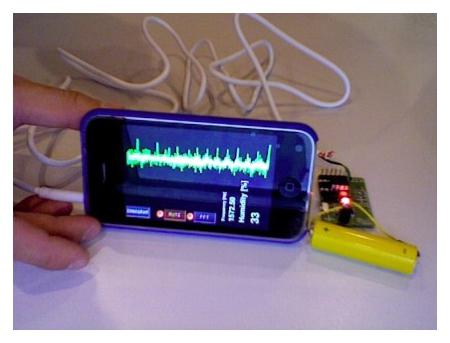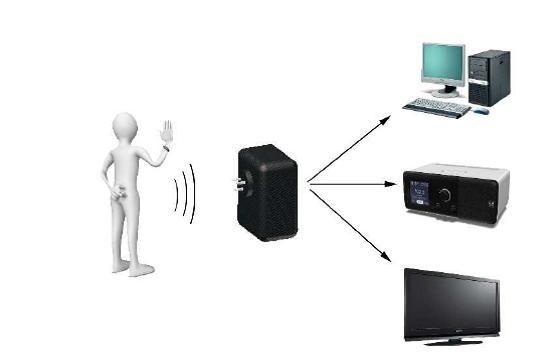The iCAN contest, which has been taking place in China for many years, was first opened to teams from around the world two years ago. This year, Switzerland participated for the first time with encouragement from the Federal nano-tera.ch program and from EPFL Professor Jürgen Brugger, head of the Microsystems Laboratory, who organized a national selection competition last March.
The condition for participating in the contest: design an original application using sensors that will “wow” a jury of experts. Mission accomplished for the team made up of Yujia Zhai, David Bonzon and Christian Adamczyk. Their project, entitled “Sensing the world through iPhone/Smartphone” won them third place in the contest and $1,000.
iPhone and social networks
Presented in poster format at the China Science and Technology Museum, then in an 8-minute closed-door presentation to the jury, the project was convincing. The idea: gather atmospheric data using an iPhone, then send them over social networks, in order to build a sort of “environmental data map” that is continuously being updated.
The students designed an interface – a simple electronic circuit – for connecting an iPhone to a humidity sensor using the phone’s microphone jack. The atmospheric data is gathered by pressure frequency modulation (PFM), transferred to a microcontroller and then displayed on the iPhone using an application specially developed by the students. “All smartphones have the same jack port,” explains Christian. “So this application can be used by a very widely.”
using the phone’s microphone jack. The atmospheric data is gathered by pressure frequency modulation (PFM), transferred to a microcontroller and then displayed on the iPhone using an application specially developed by the students. “All smartphones have the same jack port,” explains Christian. “So this application can be used by a very widely.”
The data, as well as the user’s position, which is detected by GPS, can then be sent over social networking sites like Twitter or Facebook to warn others of potentially adverse conditions. “We used the humidity sensor for our demonstration, but the device could work with any kind of sensor – to detect radioactivity levels, pollution, or toxic gases, for example,” adds Christian.
The students developed their idea completely outside their usual course schedules, with help from their “coach,” Dr Giovanni Boero.
Caption: Humidity data are displayed on the iPhone. The interface created by the students is connected to the jack.
Controlling the electronics in your home using simple gestures
The second team selected to represent Switzerland in Beijing, made up of students Matthieu Rüegg, Ludovic Serex and Nicolas Vachicouras and supervised by Professor Kamiar Aminian, received a Best Contribution Award (consolation prize). “We were a little disappointed. But we are really happy to have had this experience,” says Nicolas. Their project generated considerable interest.
 They developed a bracelet that enables its wearer to control the electronics in his or her home by making specific arm movements. The project aims to eventually allow elderly or handicapped individuals to be more autonomous. The bracelet has a miniature inertial measurement unit (IMU) composed of a 3D gyroscope and a 3D accelerometer, and connected to a Bluetooth kit, which send the data to the computer. Before the first use, the wearer repeats the same movement 15-20 times, to teach it to the computer. Then, the different movements of the user are recognized thanks to a Machine Learning algorithm: Principal Component Analysis (PCA). All that needs to be done is to link a specific movement to a specific task – turn on the lights by drawing a circle in the air, for example, or changing channels on the TV by clapping your hands. “We were able to employ what we’d learned in our classes,” says Nicolas.
They developed a bracelet that enables its wearer to control the electronics in his or her home by making specific arm movements. The project aims to eventually allow elderly or handicapped individuals to be more autonomous. The bracelet has a miniature inertial measurement unit (IMU) composed of a 3D gyroscope and a 3D accelerometer, and connected to a Bluetooth kit, which send the data to the computer. Before the first use, the wearer repeats the same movement 15-20 times, to teach it to the computer. Then, the different movements of the user are recognized thanks to a Machine Learning algorithm: Principal Component Analysis (PCA). All that needs to be done is to link a specific movement to a specific task – turn on the lights by drawing a circle in the air, for example, or changing channels on the TV by clapping your hands. “We were able to employ what we’d learned in our classes,” says Nicolas.
A wonderful experience
Project leader for iCAN Switzerland, Professor Jürgen Brugger can’t hide his pride. “I’m really happy about the commitment of both teams. The competition was extremely fierce. The third prize of one of the Swiss teams is outstanding achievement.” As for the EPFL students who participated, this scientific expedition to the Chinese capital will continue to be a source of motivation. “It was a fantastic opportunity to meet teams from all over the world,” says Ludovic. Not to mention the cultural wealth of the country, that made a strong impression on them. “We visited the Great Wall, the Ming Tombs and the Forbidden City. It was wonderful”, says Matthieu. As for their scientific project, they all wish to develop it, as explains Christian, speaking for his team, who received the third price. “We believe that the idea has a great potential, but there is still a lot to do. We should develop a good business model. But nothing has been decided yet.” As for Nicolas, he remains cautious. “If our idea has a real potential on the market, we will develop it. In any case, we need to take a break after this hard work, and focus on our exams”.
